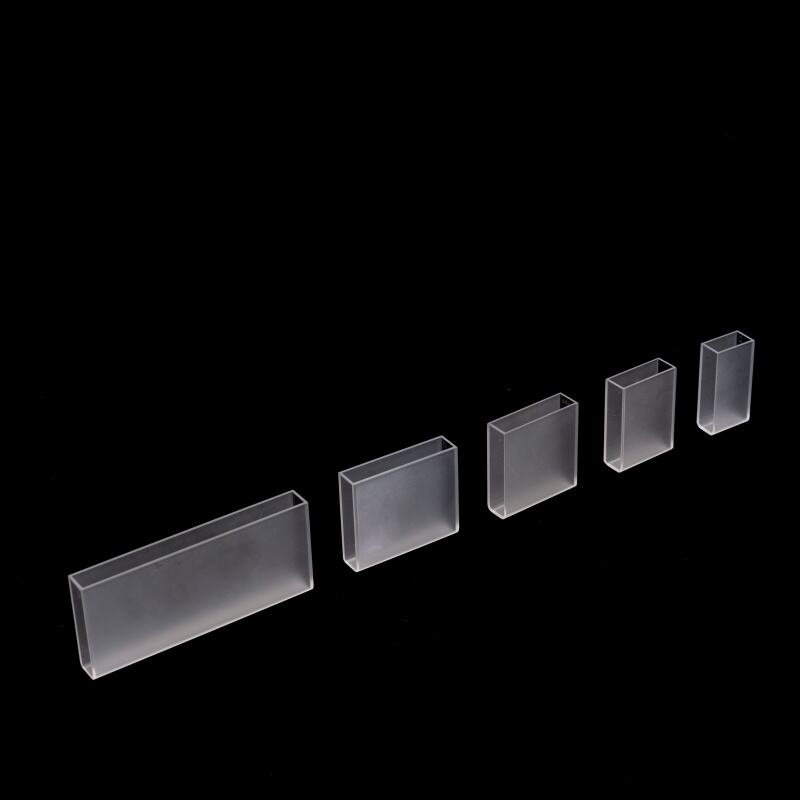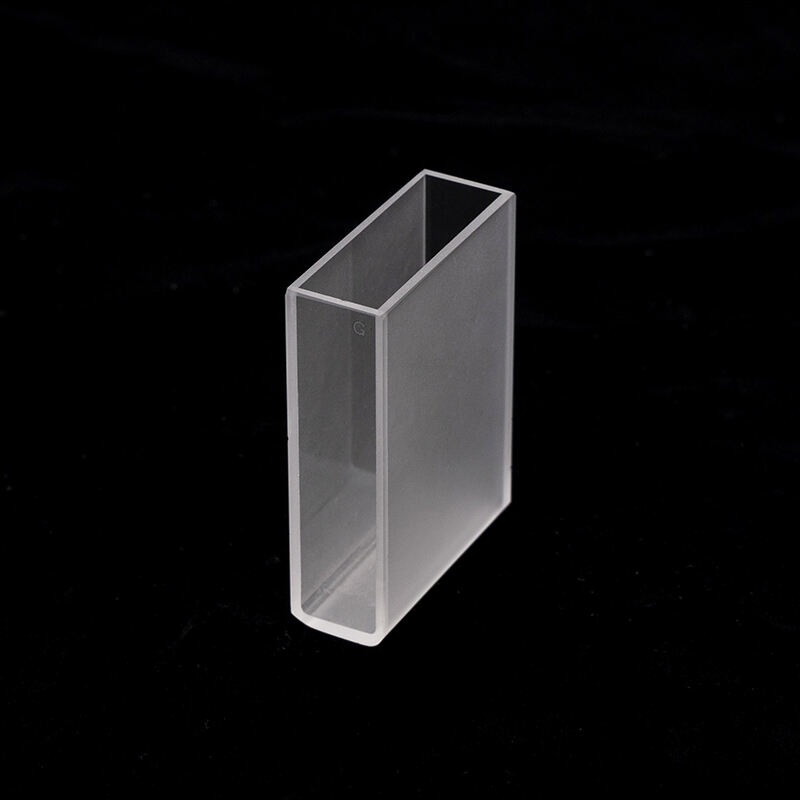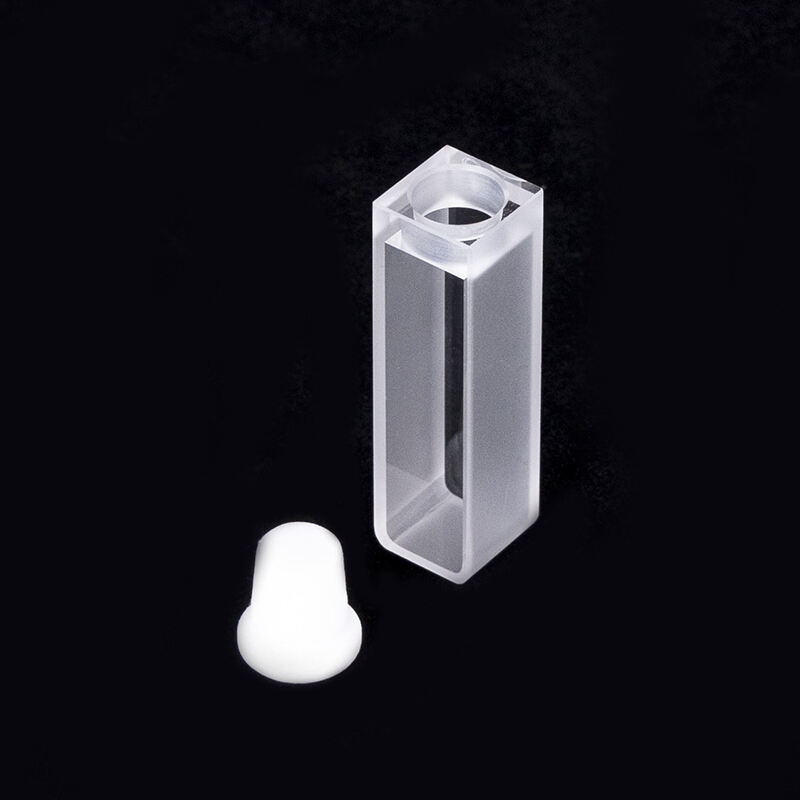UV spectrophotometer cuvette is a clear plastic container that contains liquid sample. That amount is revealed with a machine called a spectrophotometer, which scientists use to find out how much light a sample can absorb. The cuvette is constructed from specific materials that let through particular types of light and blocks others. In this way, scientists can accurately measure how much light the sample absorbs. A UV (ultraviolet) light or visible light provides the light source for this process, and the cuvette uv spectrophotometer goes into a chamber where the tests take place.
Even some tiny thing can change the entire result or data of the experiment, so the Jinke Optical UV spectroscope cuvettes have great importance in getting the accurate scientific results. These allow scientists to measure how much light has been absorbed by a given sample, which gives key information about the chemical properties of the substance they are testing. Different materials are used to construct cuvettes example glass, quartz, plastic, and so on. Glass is the most used material because it is clear and transmits light. But glass can also absorb certain kinds of light, adding another potential variable that in some cases altered the outcome of the tests, making them less accurate, he said. Quartz cuvettes, on the other hand, have better baseline because they absorb no light at all in this region. Plastic cuvettes are usually the least expensive option, but not all tests will work with spectrophotometer cuvette. It is also easy to get scratches on them and some do not allow UV light to pass too.

The Jinke Optical UV spectrophotometer cuvettes exist with different features and uses depending on the type. The standard cuvette is the most standard and works for most types of tests Usually, glass made cuvettes can accommodate sample from 0.5 to 4 milliliters. Fluorescence CuvettesThey are specially designed cuvettes. These work specifically for tests that measure fluorescence, in which a substance absorbs light and then re-emits it. Fluorescence cuvettes are constructed with special materials that avoid absorption of light, making them more reliable for test results. There is also micro cuvette. These glass cuvettes for spectrophotometer are much smaller than regular cuvettes, and they accommodate only minuscule amounts (1 to 20 microliters) of sample. Micro cuvettes are commonly used for precious or rare samples, as they consume a minimal volume of liquid for testing.

Selecting the appropriate Jinke Optical UV spectrophotometer cuvette to use in your experiment is crucial — it should enable you to obtain accurate results that you can trust. There are a number of key factors to weigh in making this choice. First you have to choose a wavelength of light you will work with in your tests. When using UV light, you need to be sure it will not get absorbed so a quartz cuvette will be optimal. If your light source is in the visible spectrum, a standard glass cuvette should suffice. You should also consider how large your sample is. Pick a cuvette that is properly sized for holding your sample and has just enough space to allow your sample without influencing the precision of your analysis. Finally, make sure to take note of the cuvette material. As such, you must select a cuvette that works well and is suited to your sample.

You need to take good care of your UV spectrophotometer cuvettes to ensure that you attain accurate and dependable results. Cuvettes are fragile and can scratch or break easily, so always handle them gently. Wearing gloves while handling cuvettes is recommended. This prevents anything like oils or dirt from your skin from contacting the cuvette surface which could interfere with the analysis and lead to results that you're not interested in. Cuvette Cleaning Ensure that your cuvettes are cleaned after each use to remove any reagent residue that may interfere with later tests. Clean them with a mild detergent and rinse well with distilled water. It is critical not to wipe cuvettes with paper towels, as this will create scratches on the surface. Instead of a cloth, use a lint-free cloth, or let the cuvettes air dry. Finally, keep your cuvette for uv vis spectrophotometer in a clean, dry place. Avoid direct sunlight and extreme heat on them to avoid damage.
As the drafting unit of the national standard for cuvettes, Jinko Optics has very high standards for product quality. Every cuvette and optical component produced by the company follows the ISO9001:2016 standard, strictly controls every link in the production process, from the selection of raw materials to the factory inspection of finished products, to ensure that every product meets high quality requirements. In addition, it has 6 invention patents and 16 utility model patents, reflecting the company's continued investment in technological innovation and process optimization, so that the products not only have excellent performance, but also have unique market competitiveness.
With more than 50 years of R&D and manufacturing experience, Jinko Optics has accumulated rich technical and practical knowledge in the field of spectral accessories. For a long time, focusing on the research and development of core products such as cuvettes, flow cells, optical components, and vapor cells has not only improved the company's technical position in the industry, but also enabled the company to quickly respond to various complex application requirements. The accumulation over the years has helped the company to continue to innovate and always be at the forefront of the industry.
Jinko Optics can provide fully customized solutions for the specific needs of different industries and customers. Whether it is drawings and samples provided by customers or personalized needs for special application scenarios, Jinko Optics can accurately design and produce optical components that meet the requirements. This flexible customization capability is particularly suitable for the precise needs of scientific research institutions, laboratories and specific industries. In addition, the company's rapid response to market changes and customer needs can ensure that customers always get the latest and most suitable technical support and products.
Jinko Optics is committed to providing customers with high-quality products with high cost performance. By optimizing production processes and management processes and reducing production costs, the company can provide more favorable prices while ensuring the excellent performance of products in quality and function. In addition to the excellent quality of the products themselves, the company also pays special attention to after-sales service, providing timely technical support and professional solutions to ensure that problems encountered by customers during use are quickly resolved. This customer-oriented service concept enables Jinko Optics to stand out in the fiercely competitive market and win the trust and praise of a wide range of customers.